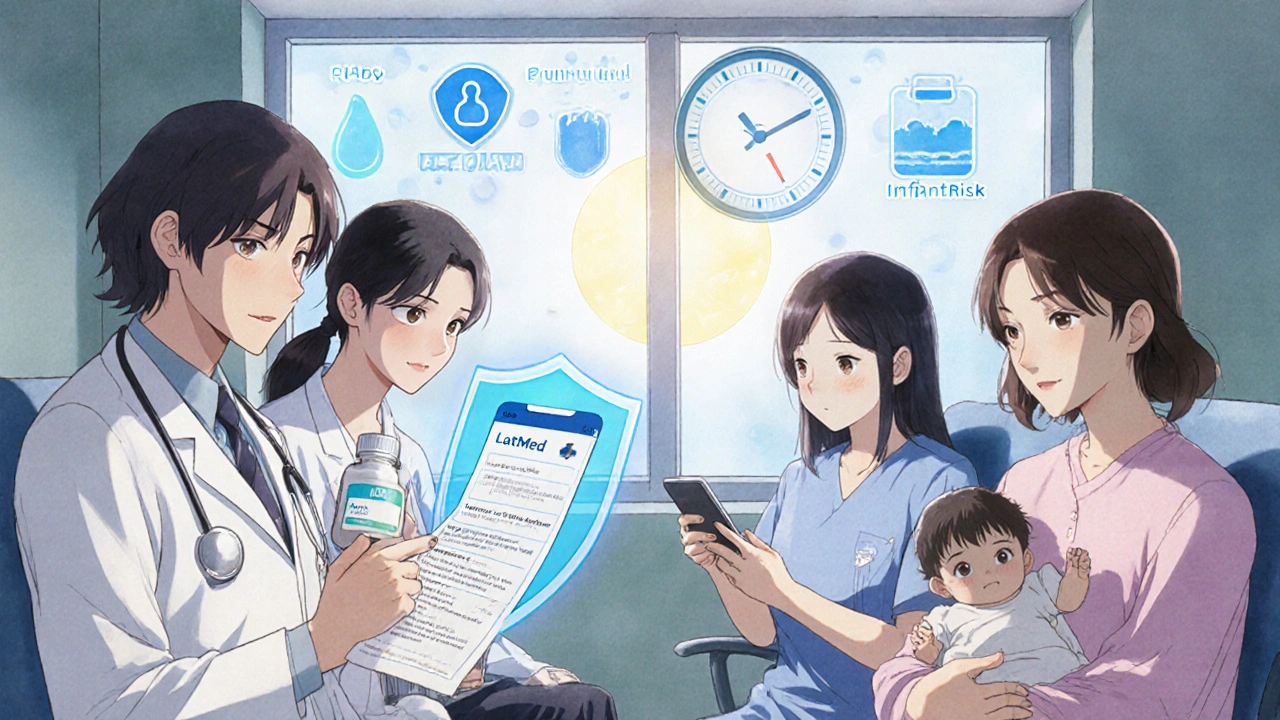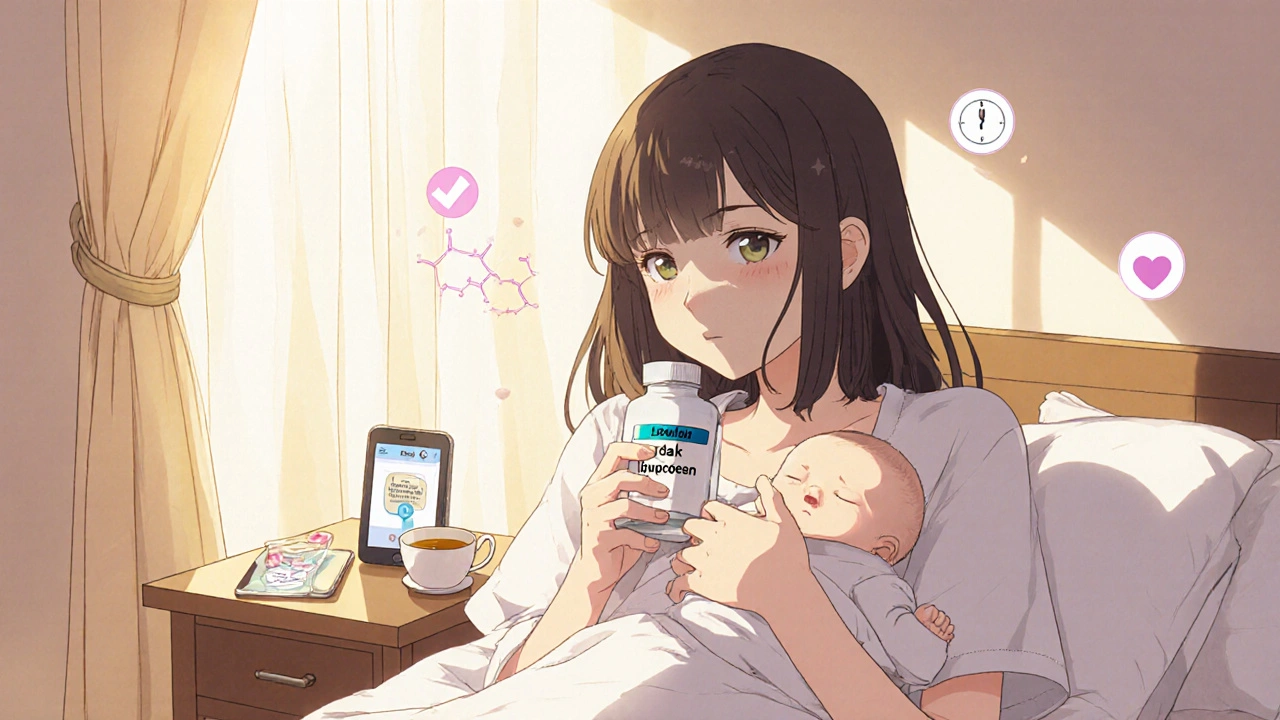Most Medications Are Safe While Breastfeeding - Here’s How to Know Which Ones
You’re on medication - maybe for pain, an infection, depression, or something else - and suddenly you’re told to stop breastfeeding. Or worse, you’re told to pump and dump for days. You’re not alone. Thousands of new parents hear this advice every year. But here’s the truth: in over 98% of cases, you don’t need to throw away your milk. The idea that all medications contaminate breast milk comes from outdated warnings on drug labels, not science. The real goal isn’t to stop feeding your baby - it’s to protect them while keeping your supply strong.
Why Pump and Dump Is Usually Unnecessary
The practice of pumping and dumping started because drug manufacturers were scared of lawsuits. Their labels say things like “not recommended during breastfeeding” - not because the medicine is dangerous, but because they didn’t test it on nursing mothers. The American Academy of Pediatrics, the CDC, and the American College of Obstetricians and Gynecologists all agree: most medications pass into breast milk in tiny, harmless amounts. In fact, only about 1% of commonly used drugs require you to stop breastfeeding at all.
Think about it this way: if you take an ibuprofen tablet, less than 0.01% of your dose ends up in your milk. That’s less than what your baby gets from your own body’s natural hormones. Acetaminophen? Even lower. The baby’s gut doesn’t absorb most of these drugs well anyway. So why discard milk that’s perfectly safe? You’re not protecting your baby - you’re risking your supply.
When You Actually Need to Pump and Dump
There are exceptions. But they’re rare. You’ll need to temporarily stop breastfeeding - and pump to keep your supply up - only if you’re taking:
- Radioactive isotopes (used in some imaging tests)
- Chemotherapy drugs
- Ergot alkaloids (like methylergonovine for postpartum bleeding)
- Some antiretroviral drugs for HIV (if you’re not on a suppressive regimen)
Even then, the stoppage is usually short - hours or a few days, not weeks. For example, if you get a thyroid scan using radioactive iodine, you might need to pump and dump for 24-48 hours. But for 99% of prescriptions - antibiotics, antidepressants, painkillers, allergy meds - you can keep feeding.
How Medications Move Into Breast Milk (And Why It Matters)
Not all drugs are the same. What makes one safe and another risky? It comes down to four key science-backed factors:
- Molecular weight: Drugs heavier than 500 Daltons don’t pass easily into milk. Most pills are too big to move through.
- Protein binding: If a drug sticks tightly to your blood proteins (over 80%), it can’t float freely into your milk.
- Half-life: Shorter half-life = less buildup. A drug like ibuprofen (2-4 hours) clears fast. Naproxen (14 hours) lingers - and has been linked to rare infant bleeding.
- Oral bioavailability: Even if a drug gets into milk, your baby’s gut might not absorb it. Drugs like sertraline pass into milk but aren’t well absorbed by infants - making them safer than they look.
This is why two antidepressants with the same name can be totally different. Sertraline (Zoloft) is one of the safest - only 0.5-2.5% of mom’s dose reaches the baby, and no side effects were found in over 98% of cases. Paroxetine? Higher transfer rate. Higher risk. Knowing these details saves you from unnecessary fear.
The Best Time to Take Your Meds (Without Pumping)
Timing beats dumping every time. If you’re taking a pill once a day, take it right after your baby’s longest sleep stretch - usually right after bedtime. That gives your body 6-8 hours to clear the drug before the next feeding. For meds taken multiple times a day, breastfeed right before you take the pill. That way, your baby gets milk with the lowest possible drug level.
Example: You take ibuprofen every 6 hours. Feed your baby at 7 a.m., then take your pill. The next feed is at 1 p.m. - by then, most of the drug is gone. No need to pump. No need to worry. This strategy keeps your milk supply steady and your baby safe.
How Long Can You Store Milk After Taking Medicine?
Medication doesn’t change how long breast milk lasts. Whether you’re on antibiotics or antidepressants, storage rules stay the same:
- Room temperature (up to 77°F / 25°C): 4 hours
- Refrigerator (39°F / 4°C): 4 days
- Freezer (0°F / -18°C): 6 months
Just label your bottles with the date and what medication you took that day. It helps if you ever need to check with a specialist. But don’t throw milk away just because you took a pill. It’s still good.
Which Medications Are Safest for Breastfeeding?
Here’s a quick guide based on real data from LactMed and the AAP:
| Medication Type | Safest Options | Higher Risk Options |
|---|---|---|
| Pain Relief | Acetaminophen, Ibuprofen | Naproxen (long half-life) |
| Antibiotics | Cephalexin, Amoxicillin, Penicillin | Clindamycin (linked to infant diarrhea) |
| Antidepressants | Sertraline, Escitalopram | Paroxetine, Fluoxetine |
| Allergy | Loratadine, Cetirizine | Diphenhydramine (can cause drowsiness in babies) |
| Thyroid | Levothyroxine | None - all are safe |

What to Do If Your Doctor Says “Pump and Dump”
Many doctors aren’t trained in breastfeeding pharmacology. A 2021 study found only 28% of family physicians could correctly name a safe antidepressant for nursing moms. Don’t take “pump and dump” as gospel. Ask: “Is this based on evidence or just a warning label?”
Bring this to your appointment:
- Go to LactMed (free, updated weekly, from the NIH)
- Call MotherToBaby at 866-626-6847 - they’re experts in medication and breastfeeding
- Download the InfantRisk Center app - it gives instant safety ratings
Bring printouts or screenshots. Most providers will adjust their advice when they see the data.
Real Stories: What Happens When You Follow the Science
One mom in Texas took sertraline while breastfeeding her 6-week-old. She was told to pump and dump for two weeks. She called MotherToBaby instead. They told her it was safe. She kept feeding. Her baby showed no side effects. Her milk supply stayed strong.
Another mom in Chicago was prescribed clindamycin for a tooth infection. She was told to stop breastfeeding for 72 hours. She pumped and dumped. When she tried to restart, her supply dropped 40%. She had to supplement for months. That’s the cost of fear.
Studies show that just 24 hours of skipping feeds can cut your milk supply by 30-50%. And 42% of women never fully recover. You’re not just losing milk - you’re losing time, money, and peace of mind.
Where to Find Reliable Info (And Avoid the Noise)
Google searches give you conflicting advice. Drug labels are misleading. Social media is full of fear. Stick to these trusted sources:
- LactMed - NIH’s free database with 1,300+ drug entries and scientific references
- MotherToBaby - 24/7 helpline staffed by pharmacists and lactation experts
- InfantRisk Center App - real-time safety ratings, updated daily
- La Leche League - free Medication Decision Tree (updated quarterly)
These aren’t just websites - they’re lifelines. The InfantRisk app alone has been downloaded over 250,000 times. Why? Because it saves parents from unnecessary stress - and broken supply.
The Bigger Picture: Why This Matters
Over 84% of U.S. babies start breastfeeding. But many quit early because of misinformation - especially around medication. The CDC’s 2023 plan calls this one of the biggest barriers to breastfeeding success. Hospitals are finally catching up - 92% now use LactMed as their go-to resource, up from 67% in 2018. But the real change happens at home.
You don’t need to be a scientist to make the right choice. You just need to know where to look. And you deserve to feed your baby without guilt, fear, or wasted milk. The science is clear. Most meds are safe. Pumping and dumping? Almost always unnecessary. Trust the data. Protect your supply. Keep feeding.
Is it safe to breastfeed while taking antibiotics?
Yes, in almost all cases. Antibiotics like amoxicillin, cephalexin, and penicillin are considered very safe for breastfeeding. They transfer in tiny amounts and rarely affect the baby. Clindamycin is an exception - it can cause diarrhea in infants, but even then, you don’t need to stop breastfeeding. Just monitor your baby and consult a specialist. Pumping and dumping is almost never needed.
Can I take pain relievers like ibuprofen while breastfeeding?
Absolutely. Ibuprofen is one of the safest pain relievers for breastfeeding moms. Only 0.01-0.06 mg/L passes into milk - less than 0.01% of your dose. Acetaminophen is equally safe. Avoid naproxen if possible - it stays in your system longer and has been linked to rare cases of infant bleeding. Timing matters: take your dose right after a feeding to minimize exposure.
What if I’m on antidepressants? Should I stop breastfeeding?
No. Sertraline and escitalopram are among the safest antidepressants for breastfeeding. Studies show no significant side effects in over 98% of babies. Paroxetine and fluoxetine are less ideal due to higher transfer rates. But even those aren’t reasons to stop. If you’re on medication for mental health, continuing to breastfeed is usually better for both you and your baby. Talk to your doctor about switching to sertraline if you’re on a riskier option.
How do I know if a medication is safe if my doctor isn’t sure?
Don’t rely on your doctor’s memory or a drug label. Use LactMed (lactmed.ncbi.nlm.nih.gov) - it’s free, updated weekly, and backed by the NIH. You can search by drug name and see exactly how much transfers to milk, what studies say, and whether there are any reported infant side effects. Call MotherToBaby at 866-626-6847 - they’ll walk you through it. Most doctors are happy to adjust their advice when they see the evidence.
Will pumping and dumping help reduce my baby’s exposure to medication?
No - and it can hurt your supply. Pumping and dumping doesn’t remove the drug faster from your body. Your liver and kidneys clear the medication on their own. Dumping milk just lowers your supply, which can make it harder to feed later. Timing your doses around feedings is far more effective. For example, taking your pill right after your baby’s longest nap gives your body time to clear it before the next feeding - no dumping needed.
How long should I wait after taking medication before breastfeeding?
It depends on the drug’s half-life. For short-acting drugs like ibuprofen or acetaminophen (half-life 2-4 hours), wait 4-6 hours after taking the pill. For longer-acting drugs, you may need to wait longer. But the easiest rule: breastfeed right before you take your pill. That way, your baby gets milk with the lowest possible drug level. For once-daily meds, take it after the longest sleep stretch. You don’t need to wait hours - just time it right.

